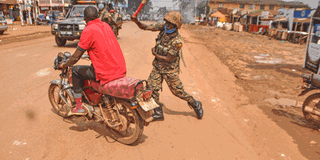Report pins security forces on rights abuses

A soldier beats a boda boda rider during the November 2020 protests . PHOTO/FILE
What you need to know:
- The Amnesty International Reports says Opposition politicians, journalists and others were arrested, detained while exercising their various rights.
The Ugandan authorities have continued to restrict the rights to freedom of expression, peaceful assembly and association, with security forces using excessive and unnecessary lethal force to kill Ugandans, a new report released by the Amnesty International states.
The State of world’s Human Rights 2020/2021 report states that at least 66 people were killed by security forces from March 2020 up to the end of the year.
“Security forces, including police, military and members of the armed civilian defence force – the Local Defence Unit (LDU) – used excessive, unnecessary, and in some cases lethal force while enforcing physical distancing and other measures introduced to contain the spread of Covid-19,” the report says.
Government officials were not available to respond to the report yesterday.
Ms Judith Nabakooba, the minister of ICT and National Guidance, her deputy Peter Ogwang and the executive director of Uganda Media Centre, Mr Ofwono Opondo also did not all respond to our repeated calls.
Mr Fred Enanga, the police spokesperson, said he had not received a copy of the report.
“Did they forward a copy of the report to the police? I can only respond when we receive a copy and our legal department analyses it. Right now, I cannot do that because we have not seen that report you are talking about,” he said.
Grim situation
The report comes a week after the US State department released another report, pinning the Ugandan security forces of similar abuses and violations.
The US State Department report on human rights situation in the country took issues with the brutality by the security forces and other violations that Ugandans have been subjected to.
The latest Amnesty International report says of the 66 people killed, at least 12 were accused of violating lockdown measures while other died during political violence orchestrated by the security forces.
“Since electoral campaigns began on November 9, dozens of people were killed in the context of riots or protests, most of them shot dead by police and other security forces, including armed individuals in plain clothes. On November18 and 19, 54 people were killed in protests that followed the arrest of Opposition presidential candidate Robert Kyagulanyi while campaigning in eastern Uganda,” the report notes. The report also highlights torture and illegal detention of Opposition politicians and their supporters.
It mentions Kakwenza Rukirabashaija, an activist from the eastern town of Iganga, who was arrested twice and tortured and Francis Zaake, the Mityana Municipality Member of Parliament who was arrested on April 19, 2020 and released on April 29 after being severely tortured.
Other issues that the report raises include the arrests of Ms Stella Nyanzi, a political activist, lawyers Aaron Kaijuka, Christine Marunga , Joan Balyerali, Brian Tuwayenga, Eric Bajole, Morgan Muhindo and Elizabeth Nafula in Kiryandongo District as they were preparing submissions for a hearing on the forced eviction of the Maragoli Indigenous people.
They were charged with “negligent acts likely to spread infectious diseases” and released on police bond on July 1.
“On September 4, police arrested eight human rights defenders in Kiryandongo District, held them for three days and charged them with threatening violence and malicious damage to property before releasing them on police bond on September 8,” the report says.
The eight people were arrested after they asked a company accused of seizing community land in the area to return livestock confiscated for allegedly trespassing on company property.
According to the report, Ms Pamela Mulongo, was brutally beaten during her arrest and detention.
Freedom of expression
The report says Opposition political members, activists, journalists and others were arrested, detained and faced prosecution for exercising their rights to freedom of peaceful assembly, expression and association.
The report also faults the Electoral Commission for enacting a roadmap under Covid-19 guidelines which were selectively applied to target the Opposition politician.
“These regulations were applied more stringently against Opposition candidates. In January, police arrested and charged five protesters, including Mr Kyagulanyi for violating the Public Order Management Act during a political rally to protest the introduction, in 2018, of a social media tax,” the report says
“In September, the Uganda Communications Commission ordered all online data communication and broadcast service providers to obtain licences before posting information on the internet,” the report adds.
Forced evictions
The report says from February to August 2020, the authorities forcibly evicted more than 35,000 Maragoli Indigenous people from their homes in Kiryandongo District in the west to pave way for industrial farming.
According to the report, the authorities failed to establish adequate procedures to protect the rights of those being evicted, despite a High Court order in 2019 which ruled that the state should urgently develop and implement protection guidelines.
Also cited in the report is government’s failure to resettle the indigenous Bennet community members around the Mount Elgon close to four decades after they were first evicted.
“These evictions, along with other housing rights violations over a 12-year period, have left at least 178 families living in internally displaced people’s camps,” the report says.
Other issues
The report accuses the security forces of using directives for the control of Covid-19 infection as a pretext to arbitrarily arrest and detain gay people.
It says on March 23, a total of 23 young gay people living in a shelter were arrested.
“Four were released on medical grounds during the first three days after their arrest; the remaining 19 were charged with “negligent acts likely to spread infectious diseases” and “disobeying legal orders” and were detained without access to their lawyers or to medical treatment. Some were denied access to antiretroviral medications,” the report says.




